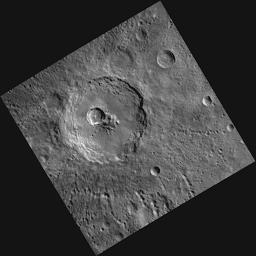This image shows two craters that formed from impacts on Mercury's surface at a very similar location. The largest crater in this image is named Carducci, in honor of the Italian poet Giosue Carducci (1835-1907). The smaller crater that is located near the center of Carducci has a diameter of approximately 20 kilometers. We can deduce that the smaller crater is younger than Carducci because the impact that formed the smaller crater destroyed a portion of Carducci's central peaks and a large impact crater like Carducci would have obliterated any evidence of the smaller crater if the smaller crater had existed previously. Simple superposition relationships like this are being applied all over Mercury's surface, to determine the relative age and timing of events in Mercury's past.
This image was acquired as part of MDIS's high-resolution albedo base map. The best images for discerning variations in albedo, or brightness, on the surface are acquired when the Sun is overhead, so these images typically are taken with low incidence angles. The albedo base map is a major mapping campaign in MESSENGER's extended mission and will cover Mercury's surface at an average resolution of 200 meters/pixel.
Date acquired: April 01, 2012
Image Mission Elapsed Time (MET): 241789276
Image ID: 1592870
Instrument: Narrow Angle Camera (NAC) of the Mercury Dual Imaging System (MDIS)
Center Latitude: -36.80°
Center Longitude: 270.2° E
Resolution: 222 meters/pixel
Scale: The diameter of Carducci is 108 kilometers (67 miles)
Incidence Angle: 54.8°
Emission Angle: 4.4°
Phase Angle: 59.3°
The MESSENGER spacecraft is the first ever to orbit the planet Mercury, and the spacecraft's seven scientific instruments and radio science investigation are unraveling the history and evolution of the Solar System's innermost planet. Visit the Why Mercury? section of this website to learn more about the key science questions that the MESSENGER mission is addressing. During the one-year primary mission, MDIS acquired 88,746 images and extensive other data sets. MESSENGER is now in a year-long extended mission, during which plans call for the acquisition of more than 80,000 additional images to support MESSENGER's science goals.
These images are from MESSENGER, a NASA Discovery mission to conduct the first orbital study of the innermost planet, Mercury. For information regarding the use of images, see the MESSENGER image use policy.

 Planetary Data System
Planetary Data System












